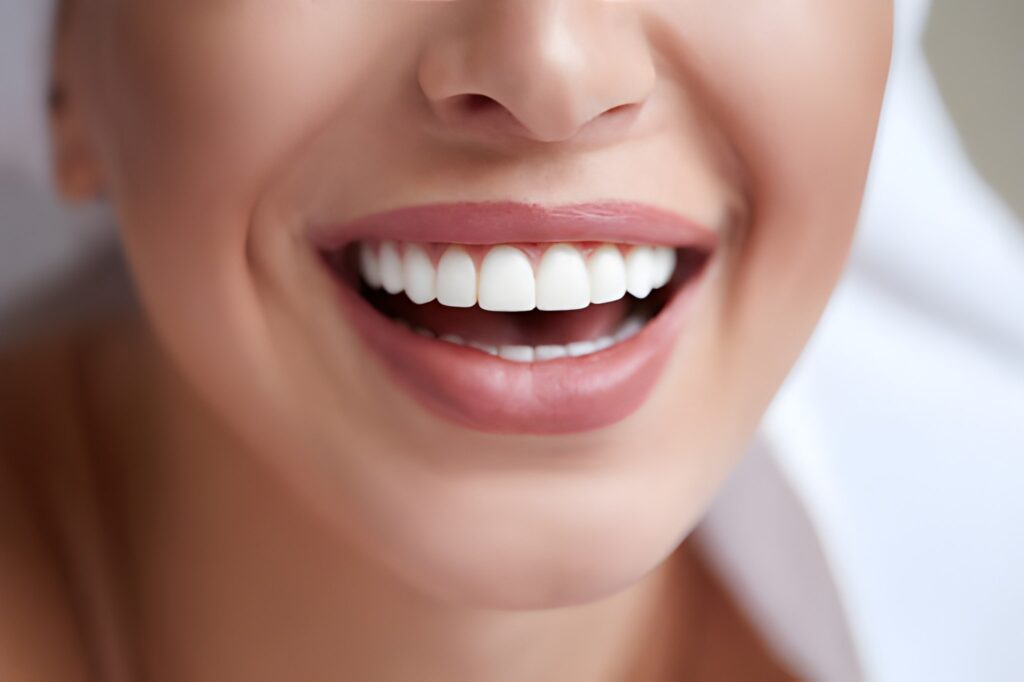What is Teeth Whitening and How Does It Work?
Teeth whitening is a cosmetic dental procedure designed to remove stains and lighten the colour of your teeth. It works by applying a whitening agent—most commonly hydrogen peroxide or carbamide peroxide—that penetrates the enamel to break down discolouration molecules, resulting in a whiter, brighter smile.
How Do Teeth Become Discoloured?
Discolouration occurs due to various lifestyle and biological factors. These fall into two main categories:
Extrinsic Discolouration
This type of staining forms on the tooth surface and is typically caused by food, drinks like coffee or red wine, smoking, and inadequate oral hygiene.
Intrinsic Discolouration
These stains form within the tooth structure and are usually deeper. Causes include ageing, certain medications, trauma to the tooth, or overexposure to fluoride during childhood.
How many sessions of teeth whitening are needed in St Helens?
Who Can Benefit from Teeth Whitening?
Most adults with healthy gums and teeth can benefit. If you’ve noticed yellowing teeth, dullness, or visible staining, professional whitening may significantly enhance your smile. However, suitability can vary depending on existing dental work and sensitivity levels.
Is Teeth Whitening Safe?
When performed by a qualified dental professional or with dentist-approved home kits, teeth whitening is generally safe. Regulations in the UK ensure that only safe concentrations of whitening agents are used, minimising potential harm to teeth or gums.
Is Teeth Whitening Safe for Everyone in St Helens?
Teeth whitening is typically safe for individuals over 18 with good oral health. However, those with severe gum disease, worn enamel, or untreated cavities should consult a dentist before undergoing treatment. Pregnant or breastfeeding individuals are also advised to delay whitening until a later time.
How long do teeth whitening results last in St Helens?
Are There Any Side Effects?
Some people may experience temporary sensitivity or mild gum irritation after treatment. These symptoms usually subside within a few days. Using products specifically designed for sensitive teeth can help minimise discomfort.
Teeth Whitening for Sensitive Teeth: What You Need to Know
What Causes Sensitive Teeth?
Tooth sensitivity can be triggered by worn enamel, gum recession, or exposed dentin. Acids from food or aggressive brushing can also contribute.
Can Teeth Whitening Cause Sensitivity?
Yes, particularly if done with high concentrations of peroxide or too frequently. However, using desensitising agents before and after treatment can reduce discomfort.
How to Reduce Sensitivity During Teeth Whitening?
Use toothpaste for sensitive teeth, avoid very hot or cold food after treatment, and follow the whitening instructions carefully. Your dentist may recommend slower, gentler options tailored to sensitive teeth.
Are There Any Alternative Teeth Whitening Options for Sensitive Teeth?
Yes. Less abrasive options like whitening toothpastes or milder home kits may be better suited. Choosing treatments with lower peroxide levels or using remineralising gels can also help.
What is teeth whitening and how does it work in St Helens?
Types of Teeth Whitening Treatments Available in St Helens
Home Teeth Whitening
This involves custom trays and whitening gel provided by your dentist. Worn daily for a short duration over two to three weeks, this method offers gradual, long-lasting results.
Zoom Whitening
A popular in-chair treatment that uses LED light to activate the whitening gel. Zoom whitening is fast and effective, often delivering noticeable results in just one visit.
Enlighten Whitening
Enlighten combines at-home and in-practice treatment for guaranteed brightening—reportedly achieving the lightest natural shade available.
Whitening Toothpastes
These contain mild abrasives and can help remove surface stains. While not as powerful as professional treatments, they’re a good maintenance tool between treatments.
Whitening Strips
Available over-the-counter, whitening strips are coated with peroxide and conform to the shape of your teeth. Results vary and are generally less dramatic than professional treatments.
Activated Charcoal & Other DIY Methods
While trendy, DIY methods like activated charcoal or baking soda can be abrasive and are not dentist-recommended. They may damage enamel or cause uneven whitening.
Are there different types of teeth whitening treatments available in St Helens?
Which Teeth Whitening Treatment is Right for Me?
This depends on your individual needs, sensitivity level, lifestyle, and budget. If you’re seeking fast results, in-practice whitening like Zoom may be ideal. For a more gradual, manageable solution, dentist-supervised home kits are excellent. Always consult your dentist to determine the best fit for your teeth.
How Long Do Teeth Whitening Results Last?
Typically, results last from six months to two years. The longevity depends on factors such as diet, smoking, oral hygiene, and the whitening method used. Professional treatments generally offer longer-lasting brightness than over-the-counter options.
Maintaining Your Whitening Results
To prolong your new smile, brush and floss daily, limit staining foods and drinks, consider using a straw, and schedule regular dental cleanings. Occasional touch-up treatments may also be recommended by your dentist.
Before and After Teeth Whitening
Many patients see a significant improvement in tooth brightness. Tooth shade guides are used before and after to show the real difference. Discuss expected outcomes with your dentist so your goals are realistic and achievable.
Transform Your Smile Today
Ready for a whiter, more confident smile? Teeth whitening offers a safe and effective way to boost your appearance and self-esteem. Whether you prefer in-clinic speed or gentle home whitening, there’s a solution for every smile.
Call to Action: Book your teeth whitening consultation with Alverna House Dental Practice and start your smile transformation today.
Frequently Asked Questions
Is teeth whitening safe for sensitive teeth?
Yes, when using dentist-approved products and methods. Sensitive teeth may require a gentler approach, such as low-peroxide home kits or desensitising gels.
Can I whiten my teeth if I have fillings or crowns?
Whitening products only affect natural teeth. Existing restorations like fillings or crowns won’t change colour, so you may need to replace them for a uniform look.
How quickly will I see results?
In-practice treatments like Zoom provide instant whitening results, while home kits generally show improvement over 1–3 weeks of regular use.
Will the whitening treatment damage my enamel?
No, not when supervised by a dental professional. Teeth whitening is safe when used in correct doses and with proper aftercare to maintain enamel integrity.
How often can I get my teeth whitened?
Professional whitening is typically done once every 12 to 24 months. Touch-ups may be recommended more frequently based on your habits and whitening goals.



